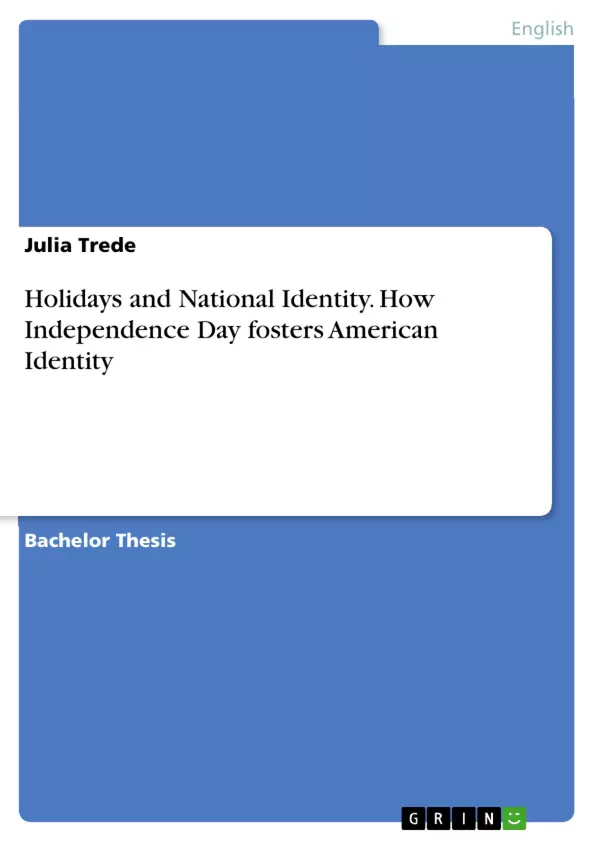The aim of this work is to analyse the meanings and functions of Independence Day which shapes American identity. For an integral analysis two important aspects have to be considered: socio-political circumstances and the techniques used for generating national identity.
In the beginning the concept of national identity will be discussed and the terms nation and identity defined. Therefore, the work draws on Benedict Anderson’s theory of imagined communities in order to establish a general understanding of nations. Patrick Colm Hogan’s techniques of nationalization provide the basis for the final analysis. After conceptualizing the major elements for the analysis, the author analyses Americas oldest holiday, Independence Day. In the course of the analysis, both socio-political developments and Hogan’s techniques of nationalization will be identified in order to show how Independence Day celebrations generate and shape American identity.
Independence Day is America’s most important national holiday since it commemorates the birth of the United States of America. The holiday solemnizes the ratification of the Declaration of Independence and the foundation of the United States of America. But the Fourth of July encompasses more meanings than commonly assumed. Since its emergence, Independence Day has been instrumentalized for generating national identity and articulating social and ethnic issues. Down to the present day, the Fourth of July has accomplished important functions that established, defined, and shaped American identity.
Inhaltsverzeichnis (Table of Contents)
- Introduction
- Conceptualizing and Theoretical Framework: National Identity
- Conceptualizing: Imagined Communities and Invented Traditions
- Theoretical Framework: Parameters promoting National Identity
- Salience
- Opposability
- Durability
- Affectivity
- How Independence Day fosters American Identity
- The Fourth of July as a Promoter of Unity and National Identity
- Hypocritical Fourth of Julys – Liberty of All?
- Anti-Slavery Movement
- Suffragette Movement
- Fourth of July under the Banner of Americanization
- The Fourth of July and the Outpour of Patriotism
Zielsetzung und Themenschwerpunkte (Objectives and Key Themes)
This paper aims to examine the meanings and functions of Independence Day in shaping American identity. It explores the relationship between sociopolitical contexts and techniques of nationalization in generating national identity. The paper analyzes how Independence Day celebrations have evolved throughout American history, focusing on their role in promoting unity, addressing social issues, and fostering a sense of belonging to a nation.
- The concept of national identity and its relationship to imagined communities and invented traditions.
- The role of Independence Day in promoting national unity and American identity.
- The evolution of Independence Day celebrations and their adaptation to changing sociopolitical circumstances.
- The use of techniques of nationalization, such as emotional attachment, durability, and opposability, in shaping American identity.
- The complexities and potential contradictions surrounding the celebration of Independence Day.
Zusammenfassung der Kapitel (Chapter Summaries)
The introductory chapter establishes the context for the study, highlighting the significance of Independence Day in American culture and the need to understand its evolving meanings. Chapter 2 explores the theoretical framework for analyzing national identity, drawing on key concepts such as imagined communities, invented traditions, and techniques of nationalization. This chapter provides the foundation for analyzing the specific case of Independence Day.
Chapter 3 analyzes Independence Day as a promoter of American identity. It examines how the holiday has been instrumentalized for generating national unity and addressing social and ethnic issues throughout history. The chapter explores both the celebratory aspects of Independence Day as well as its potential contradictions and criticisms.
Schlüsselwörter (Keywords)
This paper explores the key themes of national identity, American identity, Independence Day, imagined communities, invented traditions, techniques of nationalization, sociopolitical context, and historical evolution. It examines how these concepts intersect to shape the meaning and significance of a national holiday.
- Arbeit zitieren
- Julia Trede (Autor:in), 2015, Holidays and National Identity. How Independence Day fosters American Identity, München, GRIN Verlag, https://www.grin.com/document/511356



